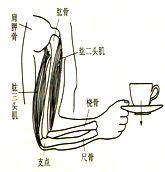问题
问答题
丹江大坝加高工程是南水北调中线工程的控制性工程,大坝坝高将由初期工程的海拔162米加高至176米.(g取10N/Kg)
(1)若坝内水的密度为1.0×103Kg/m3,求水深50m处大坝受到的水的压强.
(2)为了保证“一江清水送北京”,我市某校一个物理兴趣小组组织了一次“水库水质调查”的实践活动.他们将一根重为0.9N的圆柱棒(下端密度较大)放入装有自来水的桶里,发现该棒恰好竖直漂浮,水下部分长度为总长的3/4,然后他们将该棒放入从水库某入水口取来的水样中,棒仍竖直漂浮,测得棒浸在水样中的长度为总长的5/8.求该棒在自来水中所受的浮力大小和水样的密度.(自来水的密度为1.0×103Kg/m3)
答案
(1)h=50m,
大坝受到水的压强:
p=ρgh=1.0×103kg/m3×10N/kg×50m=5.0×105Pa;
(2)棒在自来水中所受的浮力:
F浮=G棒=0.9N;
设棒的总长为L,底面积为S,h1=
L,h2=3 4
L,由漂浮条件得F浮1=F浮25 8
ρ水gv1=ρ水库水gv2
ρ水gsh1=ρ水库水gsh2
所取水样的密度:
ρ水库水=
=1×103kg/m3×ρ水gsh1 gsh2
=1.2×103kg/m3.
L3 4
L5 8
答:(1)水深50m处大坝受到的水的压强5.0×105Pa;
(2)该棒在自来水中所受的浮力大小为0.9N,水样的密度为1.2×103kg/m3.




